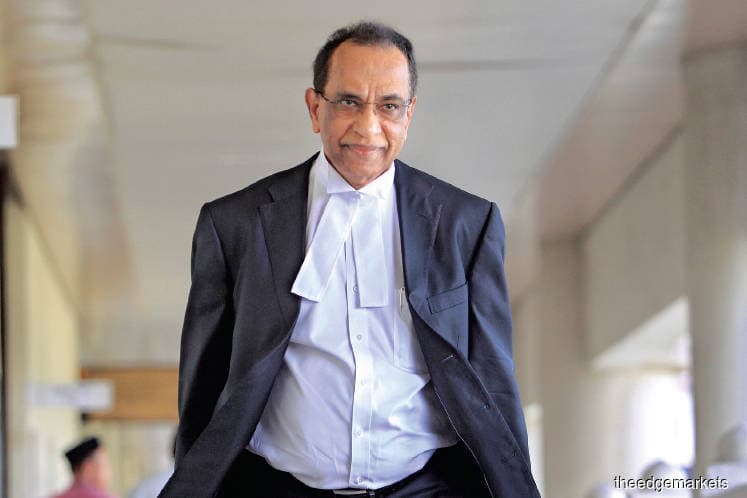
This article first appeared in The Edge Malaysia Weekly on January 13, 2020 - January 19, 2020
THE SRC International Sdn Bhd trial resumed this year with impeachment proceedings against former prime minister Datuk Seri Najib Razak for inconsistencies in his witness statements.
Ad hoc prosecutor Datuk V Sithambaram made an application to impeach the credibility of the witness under Section 145(1) and Section 155(c) of the Evidence Act, after questioning the witness on the contradiction relating to several Minister of Finance Inc (MoF Inc) minutes of meeting documents, which Najib said he had signed.
The prosecution had sought to impeach Najib as it claimed there was a material contradiction between statements he gave to the court and those that were recorded by the Malaysian Anti-Corruption Commission (MACC).
Eventually, High Court judge Mohd Nazlan Mohd Ghazali ruled that there were no material contradictions between the statements and, thus, no impeachment proceedings.
Najib evaded impeachment as a witness in the trial, but what are the implications of impeachment in a trial and what could it have meant for him?
Trial within a trial
Had impeachment proceedings commenced, the judge would have asked Najib to explain the alleged inconsistencies in his statements.
The judge would then have to determine if the statements Najib had given were made voluntarily. This would mean that the MACC officers who recorded Najib’s initial statement would have been called, thus leading to a trial within a trial.
Once the impeachment proceedings are over, the case would resume, and the judge would then reserve the decision on impeachment until the very end of the case.
Section 155(c) of the Evidence Act states: “The credit of a witness may be impeached in the following ways by the adverse party or, with the consent of the court, by the party who calls him: (c) By proof of former statements inconsistent with any part of his evidence which is liable to be contradicted;”
If Najib was found to be not credible, he could be sent to jail or fined.
No impeachment, loss for prosecution
In December, during cross-examination by Attorney-General Tan Sri Tommy Thomas, Najib testified that he may have signed the MoF Inc shareholders meeting minutes to have Article 117 included in SRC’s memorandum and articles of association.
Meanwhile, in his MACC statement, Najib stated that he had seen the documents before and that he was the one who signed the documents.
However, when asked again by Sithambaram later, the former premier said he was not sure whether he signed it.
When he was reminded that he was contradicting what he had said in the witness statement, the former premier said to use his testimony as per his witness statement.
Mohd Nazlan’s reasoning for his decision not to proceed with impeachment was that Najib had tried to explain the contradictions in the MACC witness statement and his supplementary witness statement.
“Having examined these statements, in my view, they are not irreconcilable because the apparent change in stand by the accused in the supplementary witness statement as to whether he had signed the exhibits or not is accompanied by his attempt to explain the basis for his earlier answers to MACC,” he surmised.
“As such, I find that there are no material contradictions or serious discrepancies between the two statements as highlighted vis-à-vis the four exhibits. There is therefore no justification to pursue the impeachment process against the accused in respect of this specific application by the prosecution.”
Earlier, Najib’s senior counsel Tan Sri Muhammad Shafee Abdullah had argued that impeachment proceedings should only be brought if it is absolutely clear that the witness is lying and is not credible.
He also said that an impeachment can only be done if no explanation is provided for the contradiction in the witness’ statements and argued that the witness had already explained the difference in his statements.
He added that an impeachment is a laborious and time-consuming process and should not be taken lightly.
However, Sithambaram said the explanation provided by Najib is not a true explanation.
Najib was charged with seven counts of criminal breach of trust, abuse of power and money laundering involving RM42 million from SRC.
He faces a 20-year jail term and a fine of RM5 million or five times the amount of money laundered, whichever is higher, if found guilty.
Save by subscribing to us for your print and/or digital copy.
P/S: The Edge is also available on Apple's AppStore and Androids' Google Play.